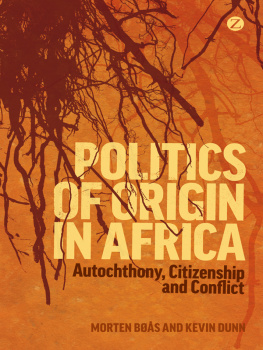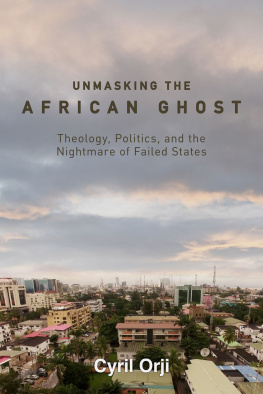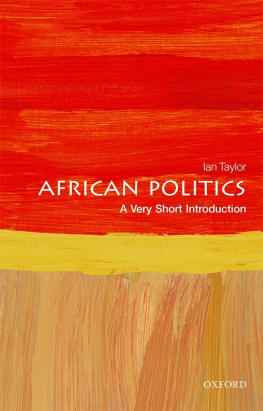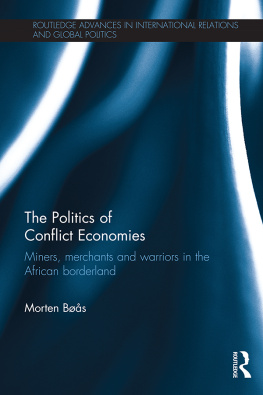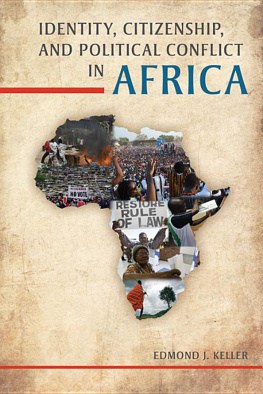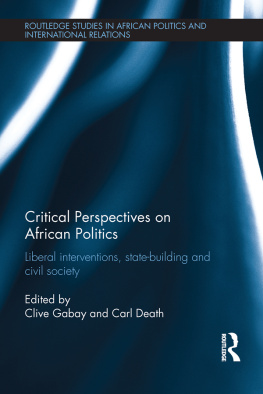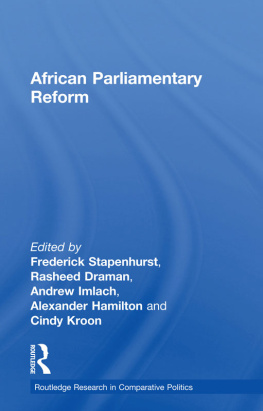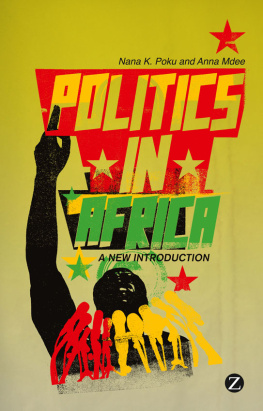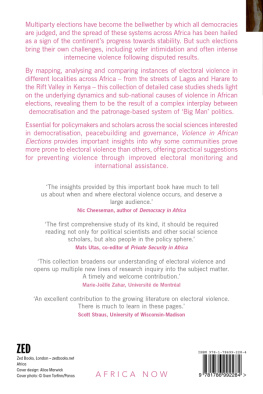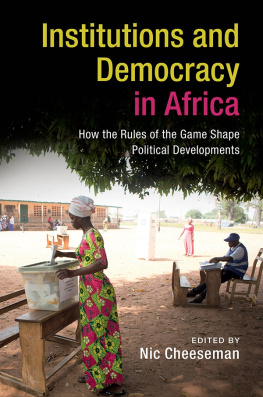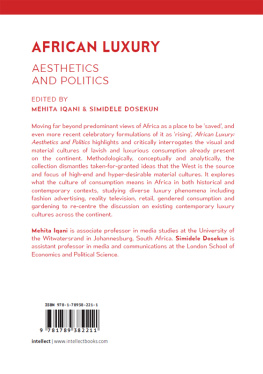
About the authors
Morten Bs is senior researcher at Fafo Institute for Applied International Studies in Oslo. His recent publications include Global Institutions and Development: Framing the world? (with Desmond McNeill, 2004), New and Critical Security and Regionalism: Beyond the nation state (with James J. Hentz, 2003), African Guerrillas: Raging against the machine (with Kevin Dunn, 2007) and, most recently, International Development, Volumes IIV (with Benedicte Bull, 2010).
Kevin C. Dunn is an associate professor of political science at Hobart and William Smith Colleges in Geneva, NY, USA. His publications include Imagining the Congo: The international relations of identity (2003), Africas Challenge to International Relations Theory (with Timothy M. Shaw, 2001), Identity and Global Politics: Theoretical and empirical elaborations (with Patricia Goff, 2004) and African Guerrillas: Raging against the machine (with Morten Bs, 2007).
POLITICS OF ORIGIN IN AFRICA
Autochthony, citizenship and conflict
Morten Bs and Kevin Dunn

Zed Books
LONDON | NEW YORK
Politics of Origin in Africa: Autochthony, citizenship and conflict was first published in 2013 by Zed Books Ltd, 7 Cynthia Street, London N1 9JF, UK and Room 400, 175 Fifth Avenue, New York, NY 10010, USA
This ebook edition was first published in 2013.
www.zedbooks.co.uk
Copyright Morten Bs and Kevin Dunn 2013
The rights of Morten Bs and Kevin Dunn to be identified as the authors of this work have been asserted by them in accordance with the Copyright, Designs and Patents Act, 1988
Set in Monotype Plantin and FF Kievit by Ewan Smith, London
Index:
Cover design: www.alice-marwick.co.uk
All rights reserved. No part of this publication may be reproduced, stored in a retrieval system or transmitted in any form or by any means, electronic, mechanical, photocopying or otherwise, without the prior permission of Zed Books Ltd.
A catalogue record for this book is available from the British Library
Library of Congress Cataloging in Publication Data available
ISBN 978 1 84813 999 2
CONTENTS
ACKNOWLEDGEMENTS
This manuscript has benefited from conversations, suggestions and assistance from a wide range of colleagues and friends. First and foremost, we would like to thank our editor Ken Barlow and the wonderful people at Zed Books for their work on this project. We would also like to thank Peter Geschiere for his invaluable insights and suggestions. Gratitude also goes out to Karel Arnaut, Ingunn Bjrkhaug, Anna Creadick, Jodi Dean, Iva Deutchman, Barrow and Strummer Dunn, Stephen Ellis, Pierre Englebert, Judith Forshaw, Anne Hatly, Jim Hentz, Stephen Jackson, Kathleen M. Jennings, Cedric Johnson, Ren Lemarchand, DeWayne Lucas, David Ost, Paul Passavant, Stacey Philbrick Yadav, Will Reno, Getor Saydee, David Sengel, Tim Shaw, Ian Taylor, Mats Utas, Henrik Vigh, Susie Winters and Vikash Yadav. We would also like to thank our invaluable friends in Cte dIvoire, the Democratic Republic of Congo, Kenya and Liberia. Support from the Research Council of Norway for fieldwork in Cte dIvoire, DRC and Liberia is also gratefully acknowledged. Finally, we are grateful to one another for the patience and friendship that sustained this project.
ABBREVIATIONS
| ADF | Allied Democratic Forces (DRC) |
| ADIACI | Association pour la Dfense des Intrts des Autochtones de Cte dIvoire |
| AFDL | Alliance des Forces Dmocratiques pour la Libration du Congo/Zare |
| ALCOP | All Liberian Coalition Party |
| ALR | Army for the Liberation of Rwanda |
| AU | African Union |
| CNDP | Congrs National pour la Dfense du Peuple |
| CPA | Comprehensive Peace Agreement |
| DRC | Democratic Republic of Congo |
| ECK | Electoral Commission of Kenya |
| ECOWAS | Economic Community of West African States |
| FAR | Forces Armes Rwandaises |
| FARDC | Forces Armes de la Rpublique Dmocratique du Congo |
| FAZ | Forces Armes Zaroises |
| FDLR | Forces Dmocratiques pour la Libration du Rwanda |
| FN | Forces Nouvelles (Cte dIvoire) |
| FPI | Front Populaire Ivoirien |
| FRCI | Forces Rpublicaines de Cte dIvoire |
| GSU | General Service Unit (Kenya) |
| HRW | Human Rights Watch |
| ICC | International Criminal Court |
| ICG | International Crisis Group |
| IDP | internally displaced person |
| KADU | Kenya African Democratic Union |
| KANU | Kenya African National Union |
| KEDOF | Kenya Elections Domestic Observation Forum |
| KNCHR | Kenya National Commission on Human Rights |
| KNYA | Kenya National Youth Alliance |
| LURD | Liberians United for Reconciliation and Democracy |
| MFA | Mouvement des Forces dAvenir (Cte dIvoire) |
| MLC | Movement for the Liberation of Congo |
| MODEL | Movement for Democracy in Liberia |
| MONUC | United Nations Organisation Mission in the Democratic Republic of Congo |
| MONUSCO | United Nations Organisation Stabilisation Mission in the Democratic Republic of Congo |
| NARC | National Alliance of Rainbow Coalition (Kenya) |
| NPFL | National Patriotic Front of Liberia |
| NTGL | National Transitional Government of Liberia |
| ODM | Orange Democratic Movement (Kenya) |
| ODM-K | Orange Democratic Movement-Kenya |
| OECD | Organisation for Economic Co-operation and Development |
| ONUCI | Opration des Nations Unies en Cte dIvoire |
| PARECO | Patriotes Rsistants Congolais |
| PDCI | Parti Dmocratique de Cte dIvoire |
| PNU | Party of National Unity (Kenya) |
| RCD | Rassemblement Congolais pour la Dmocratie |
| RDR | Rassemblement des Rpublicains (Cte dIvoire) |
| RFDG | Rassemblement des Forces Dmocratiques de Guine |
| RPF | Rwandan Patriotic Front |
| RUF | Revolutionary United Front (Sierra Leone) |
| SLDF | Sabaot Land Defence Force (Kenya) |
| TWP | True Whig Party (Liberia) |
| ULIMO | United Liberation Movement of Liberia for Democracy |
| UN | United Nations |
| UNHCR | United Nations High Commissioner for Refugees |
| UNITA | Unio Nacional para a Independncia Total de Angola |
| UNMIL | United Nations Mission in Liberia |
1 | INTRODUCTION: CONFLICT, LAND SCARCITY AND TALES OF ORIGIN
People have always been seeking the attachment of belonging to something. This something can be manifested in land, religion, a flag, an institution or anything else that makes us feel more secure and comfortable. Of course, to include is also to exclude, possibly making others insecure for not belonging. As such, there is nothing new in observing that there are clear connections between claims of belonging and conflict. What is new, however, is the context in which these processes are now taking place, a context of nervousness in which the modern state fails to deliver not only employment and social services to its inhabitants, but also basic notions of security. It is not uncommon to note that many modern states are failing to fulfil their expected material functions, but we suggest that they are also failing at the psychic level. The basic societal rules of the game that the state seems intuitively to underpin are being thrown into question. Such a situation helps foster dreams about a past when things were different; when there was not only food on the table, but also order and opportunity. What this leads to is nostalgia; a melancholy for a seemingly lost past. This is the feeling of having lost something; we may not necessarily be able to articulate the feeling very clearly, but it still seems very dear to us. It is a situation of despair, of loss of direction and purpose. And in the midst of this, one searches both to make sense of that loss and to rectify it.
Next page
